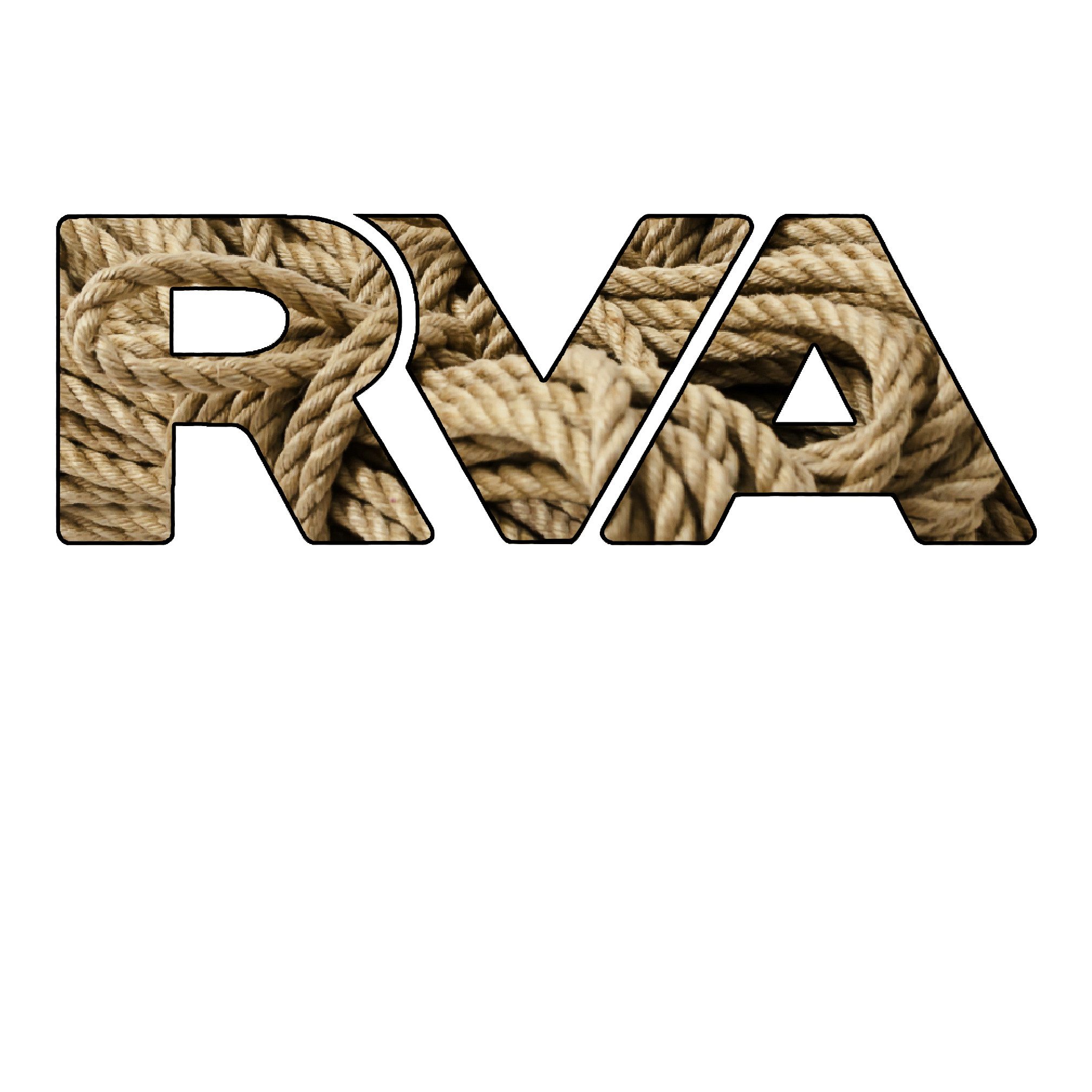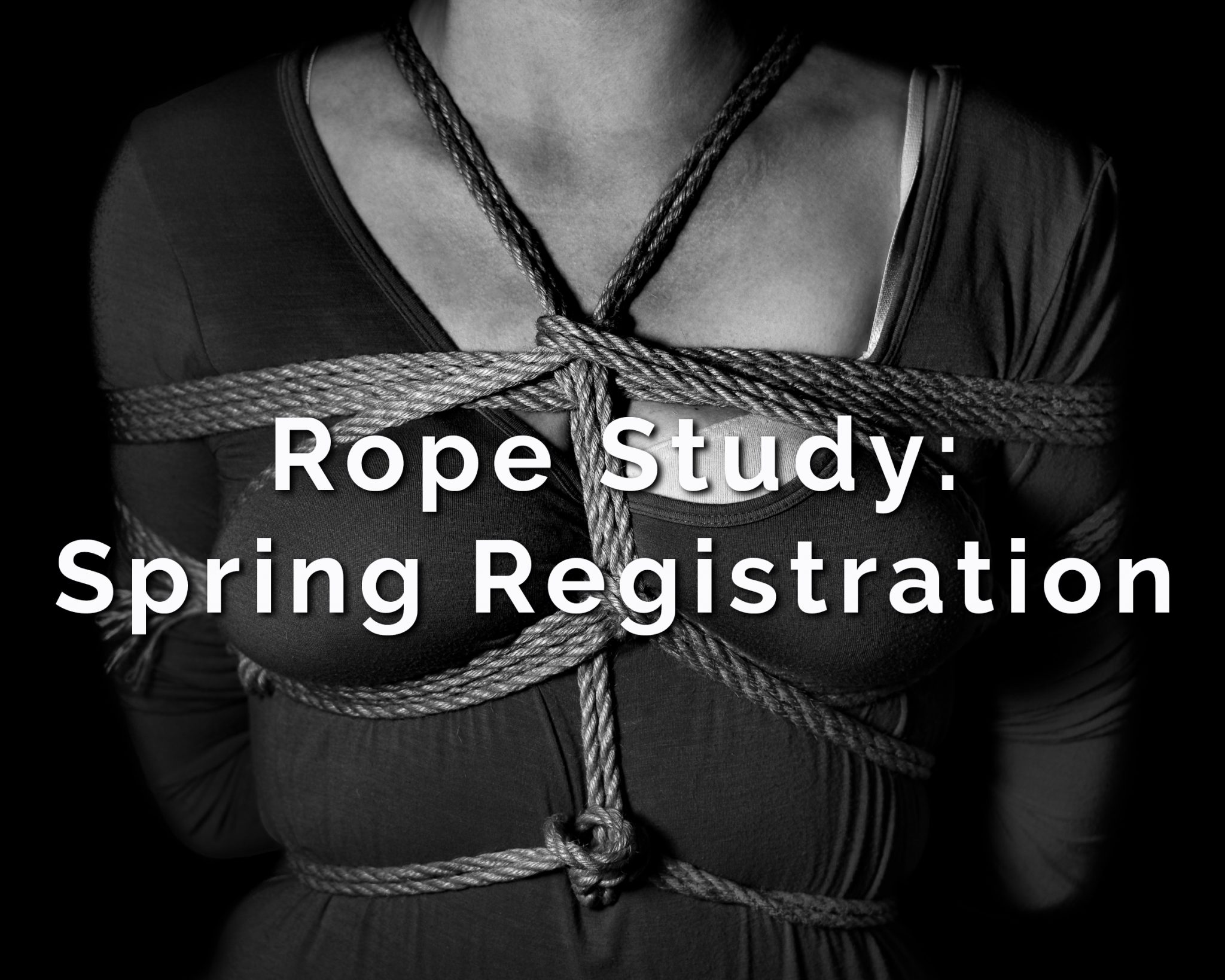Rope Study will be running two courses this spring:
Rope 201: Foundations
Ready to get serious with rope? Learn the fundamentals of rope bondage for tops and bottoms.
- Prerequisite: none (though Rope 101 is recommended)
- Sessions: 8 classes, 3 hours each
- Location: private rope studio in Richmond, VA (north side)
- Time: 1pm – 4pm
- Dates: 3/4, 3/11, 3/25, 4/8, 4/22, 5/6, 5/20, 6/3
- Cost: $100 per person (about $12.50/class or $4/hour per person)
- Maximum: 5 tying pairs
Rope 301: Partial Suspension Essentials
Ready for up-lines? Learn the essential skills for the wonderful world of partials.
- Prerequisite: Foundations or equivalent skill/knowledge for tops and bottoms
- Sessions: 6 classes, 2 hours each
- Location: private rope studio in Richmond, VA (north side)
- Time: 10am – 12pm
- Dates: 3/4, 3/11, 3/25, 4/8, 4/22, 5/6
- Cost: $70 per person (about $12/class or $5/hour per person)
- Maximum: 4 tying pairs
Interested in taking one of these courses this spring? Register below!
Registrations will be taken on a first-come, first-served basis. Registrations after the maximum are filled will be added to the wait list in the same order.
More Details
We want to make sure that people who take these classes with us understand what they’re getting themselves into. Please take the time to read the information below carefully. Thank you!
What Others Have Said
If you haven’t heard anything about these classes before, you can read some quotes from people who’ve taken them on the Rope Study page. Just scroll down a bit on that page until you see the first section with a black background.
About the Courses
The Foundations class provides tops and bottoms with a solid foundation in rope bondage skills in the style of Japanese-inspired rope bondage, a.k.a. shibari or kinbaku. We do not teach Western-style or decorative rope bondage. We do believe that the skills and techniques in Foundations will be helpful for and applicable to all styles of rope bondage, but you should know that our approach and focus is on Japanese-style rope bondage with the assumed goal of moving into more complex patterns and the potential inclusion of partial and/or full suspension in the Japanese style in the future.
Likewise, the Partial Suspension Essentials class provides the fundamental skills for risk-informed partial suspension in the style of Japanese-inspired rope bondage. Again, we believe the course will prepare you to work with partial suspensions in any style, but other styles will not be our focus.
We also want you to know that taking either of these courses is a little like taking a college-level course. Between each class, we will ask you to read, watch, or listen to a variety of articles, videos, and podcasts and then reflect on that material. We will also ask you to engage in discussions about that material with other members of the class. Finally, we will expect you to spend time practicing between each class, and we suggest you practice for at least an hour at a minimum of 2 to 3 times per week.
In addition, our focus on rope instruction, particularly at the Foundations level, is on risk awareness and mitigation. We will start the class by talking about the balance among aesthetics, efficiency, intention, and risk, and while we understand that some people choose to emphasize different aspects, we believe you should know what your risks are and how you can mitigate them regardless of whether or not you choose to do so (i.e., so that your risk-taking is informed).
You should also know that we assume the people who take these classes are looking to improve their skills, so we will critique your tying and bottoming throughout the course. We try to do this kindly and constructively, and our only purpose is to help you improve as much as possible (not to criticize, tear-down, nit-pick, or demoralize). We are also well aware that we are not perfect ourselves and don’t mean to imply otherwise through our critiques. We are all striving for ideals, and we know that reality usually falls short of any ideals worth having. We also recognize that we are offering critiques based on our experience and what we believe about “tying well.” You are welcome to disagree, of course. However, we ask that you try it our way while you’re with us and give our advice a shot before dismissing it. Later, if you still disagree or feel it’s not for you, you are obviously entitled to make different choices.
Finally, because each class builds on the previous class, it’s important that you not skip any classes. If you absolutely must miss a class, we ask that you either meet with other members of the class or schedule private instruction time with us to make up the material you missed before the next class. Unfortunately, given the time constraints of the small-group classes, we cannot take time during the class to re-teach material that you missed.
All of that may be more commitment than some of you are looking for at this point. And honestly, if all you want to do is learn a few easy ways to tie your partner up, or to tie them to a cross to beat them or to a bed for sexy times, then these classes are probably more than you need. We (and many others) can teach you those things at Rope Bite for free!
But if you’re looking to really improve your rope bondage skills, or you’re interested in rope bondage “as art,” or if you want to eventually get into partial or full suspension, then we believe these classes will help you.
Of course, no one is grading you or anything, so this is more like auditing a college course … which means that you’ll get out of these classes what you put into them.
Practice Partners vs. Single Participants
We believe that much of our curriculum will be helpful to anyone interested in rope bondage, regardless of their role, the style of rope, or whether or not they plan to tie with others or to self-tie. In fact, we’ve specifically designed the course for both tops and bottoms, and we believe bottoms have just as much to learn as tops.
While single participants will still be able to learn a good amount from these courses, in order to get the most from this course, we strongly recommend you take it with someone with whom you can work both during and between classes. This does not need to be a sexual, sensual, or romantic partner. This only needs to be someone you can trust to practice with you during and between classes.
We will accept single participants, but we want to be clear from the beginning that you will likely get more from the course if you can find someone to practice with regularly.
If you do not currently have a practice partner, you are welcome to advertise for one by commenting on the posts on Fetlife. We will create a post in the RVA Rope group for that purpose
If we are aware of someone else who is looking for a partner, we will try to arrange that. However, we cannot make any promises that we will be able to help with that.
Vetting and Peer Contract
Because these classes are offered at a private rope studio, we do vet potential participants. This means that if we do not already know you, we will ask you to provide references and may ask to meet with you beforehand. Don’t let this discourage you from registering. Just be prepared to offer those references or to be willing to meet before the first class.
In addition, we do ask that participants agree to our peer contract and release of liability. In brief, this contract releases Rope Study from liability and commits you to following the Core Values and tying within your experience level and/or the level of study in the course. We encourage you to review the contract before registering.
Other Questions
We recommend that you read the Frequently Asked Questions at the bottom of the Rope Study page. After that, if you still have questions, please feel free to contact us and we will reply as soon as possible.



When is the next session
We run these courses in the spring and fall of each year (depending on interest). We hope to offer the next round of courses starting in September, though we may run some focused workshops before then. Courses and workshops will always be announced here on the site. If you’d like to keep track of things, we recommend subscribing to the newsletter. Thanks!